牛津译林版八年级下册 b 现在完成时
牛津译林版8BUnit2现在完成时延续性动词
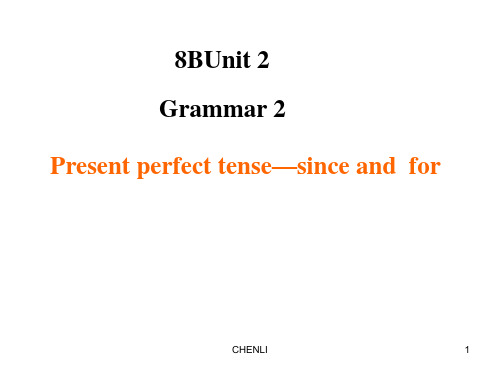
For example:
Eddie has been to South Hill many times.
It is very nice and he wants to go there
again.
CHENLI
3
We use ‘have (has) gone’ to express the idea that someone went to some place and is still there.
CHENLI
18
-When did you get to know Jack?
-Two years ago.
-Then you've known each other for more than two years.
-That's right.
7.终止性动词的用法特征
1).终止性动词可用来表示某一动作完成,因此可 用于现在完成时。如:
years.
Mike borrowed the books two days ago.
Mike has kept the books for two days.
CHENLI
11
We have learnt English
__f_o_r_ 3 years. __s_in_c_e_ 3 years ago. ___s_n___c_e_w_e___c_a__m____e___(c_o_m__e)_h_e_r_e
I have been here since five months ago.
自从五个月前,我已经在这儿了。
CHENLI
14
3).since+从句
牛津译林8BU1语法现在完成时
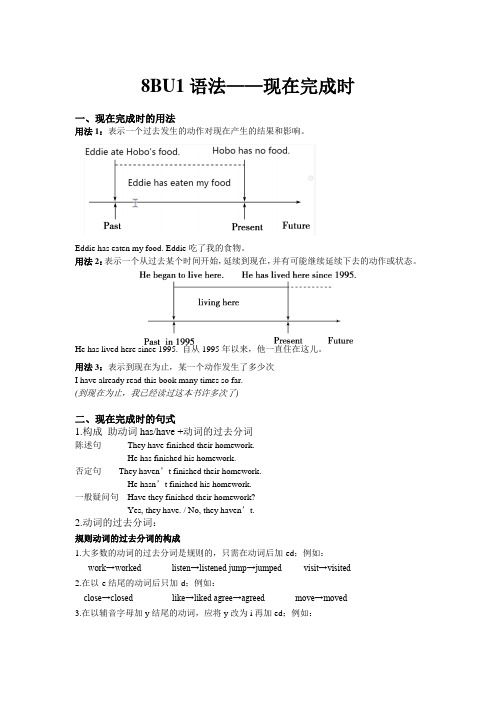
8BU1语法——现在完成时一、现在完成时的用法用法1:表示一个过去发生的动作对现在产生的结果和影响。
Eddie has eaten my food. Eddie吃了我的食物。
用法2:表示一个从过去某个时间开始,延续到现在,并有可能继续延续下去的动作或状态。
He has lived here since 1995. 自从1995年以来,他一直住在这儿。
用法3:表示到现在为止,某一个动作发生了多少次I have already read this book many times so far.(到现在为止,我已经读过这本书许多次了)二、现在完成时的句式1.构成助动词has/have +动词的过去分词陈述句They have finished their homework.He has finished his homework.否定句They haven’t finished their homework.He hasn’t finished his homework.一般疑问句Have they finished their homework?Yes, they have. / No, they haven’t.2.动词的过去分词:规则动词的过去分词的构成1.大多数的动词的过去分词是规则的,只需在动词后加-ed;例如:work→worked listen→listened jump→jumped visit→visited2.在以-e结尾的动词后只加-d;例如:close→closed like→liked agree→agreed move→moved3.在以辅音字母加y结尾的动词,应将y改为i再加ed;例如:study→studied carry→carried try→triedworry→worried4.以重读闭音节结尾的动词,要双写末尾的辅音字母再加-ed;例如:stop→stopped drop→dropped不规则动词的过去分词的构成1. 有些动词的原形和过去分词相同;例如:put→put hurt→hurt become→become run→run 2.改变单词中间元音字母;例如:sit→sat win→won hold→held3.把单词结尾的字母d改为t;例如:lend→lent spend→spent send→sent4.以eep结尾的动词,把eep改为ept;例如:keep→kept sleep→slept5. 过去分词以aught或ought结尾;例如:teach→taught buy→bought6.以ay结尾的动词,把ay变成aid;例如:say→said pay→paid7.在原形词尾加n或en;例如:give→given eat→eaten三、现在完成时的时间状语already(用于肯定句), yet(用于否定句和疑问句), since+一点时间, for+一段时间, never, ever, three times(其它表示频率的词, once, twice等)before, recently, in the past/last few years, so far, this month, today, now知识点1:already与yet用法区别already 用于肯定句,一般放在助动词与过去分词之间。
牛津译林版英语八年级下册8B Unit 2 Grammar(2)课件

现在完成时和一般过去时
He _h_a_s__w_o_r_k_e_d__(work) in our school for one
year.
He _c_a_m_e__(come) to our school last year/in
her husband to open the door. • I can’t find the way to the railway station
because I have lost my map.
用法: 二. for + 时间段
since + 时间点 present perfect tense
• in the past(last/ recent)three years
• recently,over / during the past century
• how long, all one’s life
2. 上下文提示结果 • He’s crying. He hasn’t passed the exam. • She has lost her key so she has to wait for
3. Tommy has had this motorcycle ___f_o_r___ three years.
4. I have been in Jiangyin __f_o_r____ forty years.
5. My parents has been married since twenty years __a_g_o____.
• buy → have • open → be open • close →be closed • join →be in / be a member of… • go to school → be at / in school • borrow → keep • catch a cold → have a cold • get to know → know • begin to study → study • get married → be married • wake up → be awake
牛津译林版八年级下册 8B-现在完成时

现在完成时⒈构成Have/has +过去分词现在完成时得肯定式、否定式与疑问式:【提示】①现在完成时得肯定式与否定式有其缩写形式:have→’ve, has→’s、例如:She’s worked、=She has worked、 I’ve not worked、 = I haven’t worked、②现在完成时得否定疑问句形式为:Have you not worked? Have they not worked? Has he not worked?其缩写形式为:Haven’t you worked? Haven’t they worked? Hasn’t he worked?③现在完成时得简略回答形式为:Yes, I have、 No, I have not/haven’t、⒉用法⑴过去动作产生得影响等表示过去发生得某一动作对现在造成得影响或产生得结果。
在没有具体时间状语得情况下,现在完成时可以表示某一行为动作在说话之前已经完成,而其结果或影响至今仍然存在。
因此,现在完车时这一时态强调得就是过去得动作同现在得联系,也就就是强调现在得影响与结果。
例如:Someone has broken the window、(“打破”这一动作虽然发生在过去,但影响延续至今,其结果就是窗子仍然就是破得,The window is now broken、)I have lost my pen、(结果就是:我现在无钢笔可用,I have no pen to use、)He’s locked the door、(结果就是:现在门锁上了,我们进不去,Now the door is locked and we can’t go in、)The party has started、 (The party started and now it is going on、)I’ve forgotten her name= I forgot her name、她今天还没吃任何东西、(现在一定很饿了)_________________________________________________________________我已经吃过午饭了(现在不饿了)____________________________________________________⑵过去得动作延续到现在与未来表示一个开始于过去,持续到现在,并可能继续下去得动作或状态,常同for, since引导得时间状语连用,或用于How long…(多久)句型中,表示持续得时间。
牛津译林版八年级英语下册:现在完成时讲解和练习(有答案)
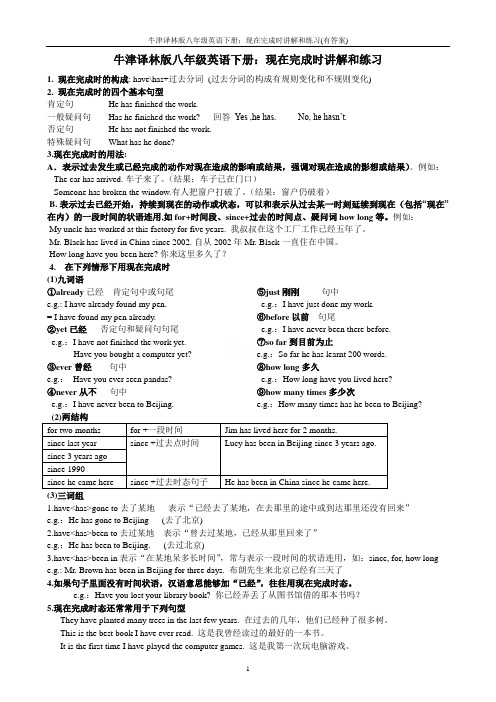
牛津译林版八年级英语下册:现在完成时讲解和练习1. 现在完成时的构成: have\has+过去分词(过去分词的构成有规则变化和不规则变化)2. 现在完成时的四个基本句型肯定句He has finished the work.一般疑问句Has he finished the work? 回答Yes ,he has. No, he hasn’t.否定句He has not finished the work.特殊疑问句What has he done?3.现在完成时的用法:A.表示过去发生或已经完成的动作对现在造成的影响或结果,强调对现在造成的影想或结果)。
例如:The car has arrived. 车子来了。
(结果:车子已在门口)Someone has broken the window.有人把窗户打破了。
(结果:窗户仍破着)B. 表示过去已经开始,持续到现在的动作或状态,可以和表示从过去某一时刻延续到现在(包括“现在”在内)的一段时间的状语连用,如for+时间段、since+过去的时间点、疑问词how long等。
例如:My uncle has worked at this factory for five years. 我叔叔在这个工厂工作已经五年了。
Mr. Black has lived in China since 2002. 自从2002年Mr. Black 一直住在中国。
How long have you been here? 你来这里多久了?4. 在下列情形下用现在完成时(1)九词语①already已经肯定句中或句尾e.g.: I have already found my pen.= I have found my pen already.②yet已经否定句和疑问句句尾e.g.:I have not finished the work yet.Have you bought a computer yet?③ever曾经句中e.g.:Have you ever seen pandas?④never从不句中e.g.:I have never been to Beijing. ⑤just刚刚句中e.g.:I have just done my work.⑥before以前句尾e.g.:I have never been there before.⑦so far到目前为止e.g.:So far he has learnt 200 words.⑧how long多久e.g.:How long have you lived here?⑨how many times多少次e.g.:How many times has he been to Beijing?(3)三词组1.have<has>gone to去了某地表示“已经去了某地,在去那里的途中或到达那里还没有回来”e.g.:He has gone to Beijing (去了北京)2.have<has>been to去过某地表示“曾去过某地,已经从那里回来了”e.g.:He has been to Beijing. (去过北京)3.have<has>been in 表示“在某地呆多长时间”,常与表示一段时间的状语连用,如:since, for, how longe.g.: Mr. Brown has been in Beijing for three days. 布朗先生来北京已经有三天了4.如果句子里面没有时间状语,汉语意思能够加“已经”,往往用现在完成时态。
牛津译林版英语八下_Units 1-3 现在完成时语法讲解和练习
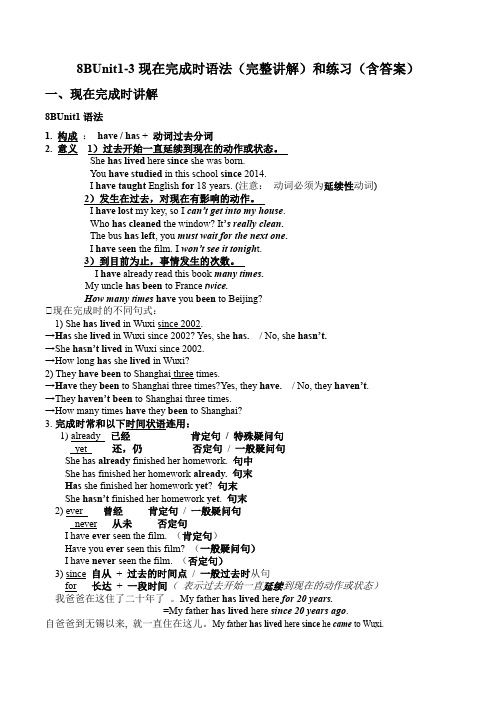
8BUnit1-3现在完成时语法(完整讲解)和练习(含答案)一、现在完成时讲解8BUnit1语法1. 构成:have / has + 动词过去分词2. 意义1)过去开始一直延续到现在的动作或状态。
She has lived here since she was born.You have studied in this school since 2014.I have taught English for 18 years. (注意:动词必须为延续性动词)2)发生在过去,对现在有影响的动作。
I have lost my key, so I can’t get into my house.Who has cleaned the window? It’s really clean.The bus has left, you must wait for the next one.I have seen the film. I won’t see it tonigh t.3)到目前为止,事情发生的次数。
I have already read this book many times.My uncle has been to France twice.How many times have you been to Beijing?★现在完成时的不同句式:1) She has lived in Wuxi since 2002.→Has she lived in Wuxi since 2002? Yes, she has./ No, she hasn’t.→She hasn’t lived in Wuxi since 2002.→How long has she lived in Wuxi?2) They have been to Shanghai three times.→Have they been to Shanghai three times?Yes, they have./ No, they haven’t.→They haven’t been to Shanghai three times.→How many times have they been to Shanghai?3.完成时常和以下时间状语连用:1)already 已经肯定句/ 特殊疑问句yet 还,仍否定句/ 一般疑问句She has already finished her homework. 句中She has finished her homework already.句末Has she finished her homework yet? 句末She hasn’t finished her homework yet. 句末2) ever 曾经肯定句/ 一般疑问句never 从未否定句I have ever seen the film. (肯定句)Have you ever seen this film? (一般疑问句)I have never seen the film. (否定句)3) since 自从+ 过去的时间点/ 一般过去时从句for 长达+ 一段时间(表示过去开始一直延续到现在的动作或状态)我爸爸在这住了二十年了。
牛津英语译林版八下:现在完成时中长短动词的转化
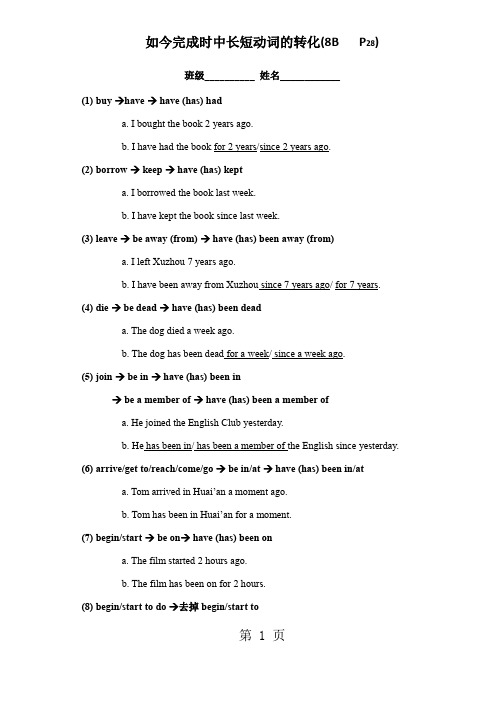
如今完成时中长短动词的转化(8B P28)班级__________ 姓名____________(1) buy →have → have (has) hada. I bought the book 2 years ago.b. I have had the book for 2 years/since 2 years ago.(2) borrow → keep → have (has) kepta. I borrowed the book last week.b. I have kept the book since last week.(3) leave → be away (from) → have (has) been away (from)a. I left Xuzhou 7 years ago.b. I have been away from Xuzhou since 7 years ago/ for 7 years.(4) die → be dead → have (has) been deada. The dog died a week ago.b. The dog has been dead for a week/ since a week ago.(5) join → be in → have (has) been in→ be a member of → have (has) been a member ofa. He joined the English Club yesterday.b. He has been in/ has been a member of the English since yesterday.(6) arrive/get to/reach/come/go → be in/at → have (has) been in/ata. Tom arrived in Huai’an a moment ago.b. Tom has been in Huai’an for a moment.(7) begin/start → be on→ have (has) been ona. The film started 2 hours ago.b. The film has been on for 2 hours.(8) begin/start to do →去掉begin/start to第 1 页a. People began to use computers many years ago.b. People have used computers many years ago.(9) get+adj. →变get为be+adj. → have (has) been +adj.a. My parents got married 25 years ago.b. My parents have been married for 25 years.(10) open →be open →have (has) been opena. The new supermarket opened at 8 o’clock this morning.b. The new supermarket has been open since 8 o’clock this morning.(11) close →be closed →have (has) been closeda. The park closed last week.b. The park has been closed since last week.(12) turn off → be off/keep…off→物+have (has) been off人+have (has) kept…offa. I have kept the light off for 5 hours.b. The light has been off for 5 hours.(13) turn on → be on/keep…on→物+have (has) been on人+have (has) kept…ona. She turned on the TV 5 hours ago.b. She has kept the TV on for 5 hours.c. The TV has been on for 5 hours.(14) fall +adj. →变fall 为be+adj. → have (has) been +adj.a. The student fell asleep last night.b. The student has been asleep since last night.(15) catch fire → be on fire → have (has) been on firea. The house caught fire yesterday.b. The house has been on fire since yesterday.第 2 页(16) catch a cold → have a cold → have (has) had a colda. Tom caught a cold last week.b. Tom has had a cold since last week.(17) get to know → know → have (has) knowna. I got to know her 5 years ago.b. I have known her for 5 years.(18) put on → be in →have (has) been in→ wear → have (has) worna. The little girl put on the dress an hour ago.b. The little girl has worn the dress for an hour.c. The little girl has been in the dress for an hour.(19) become → be → have (has) beena. My sister became an engineer 2 years ago.b. My sister has been an engineer for 2 years.(20) finish/stop/end → be over → have (has) been overa. The meeting finished half an hour ago.b. The meeting has been over for half an hour ago.注意:〔1〕短动词和长动词都可以用如今完成时。
牛津译林版八年级英语下册现在完成时语法知识讲解
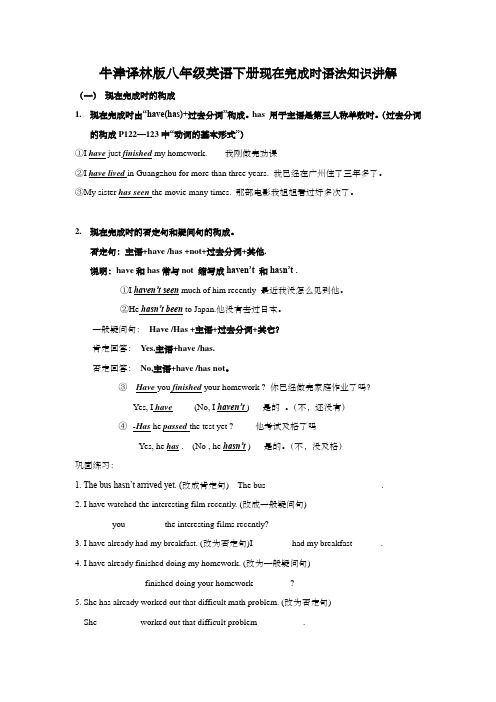
牛津译林版八年级英语下册现在完成时语法知识讲解(一)现在完成时的构成1.现在完成时由“have(has)+过去分词”构成。
has 用于主语是第三人称单数时。
(过去分词的构成P122—123中“动词的基本形式”)①I have just finished my homework. 我刚做完功课②I have lived in Guangzhou for more than three years. 我已经在广州住了三年多了。
③My sister has seen the movie many times. 那部电影我姐姐看过好多次了。
2.现在完成时的否定句和疑问句的构成。
否定句:主语+have /has +not+过去分词+其他.说明:have和has常与not 缩写成haven’t 和hasn’t .①I haven’t seen much of him recently 最近我没怎么见到他。
②He hasn’t been to Japan.他没有去过日本。
一般疑问句:Have /Has +主语+过去分词+其它?肯定回答:Yes.主语+have /has.否定回答:No,主语+have /has not。
③---Have you finished your homework ? 你已经做完家庭作业了吗?--Yes, I have(No, I haven’t ) 是的。
(不,还没有)④---Has he passed the test yet ? 他考试及格了吗----Yes, he has . (No , he hasn’t ) 是的。
(不,没及格)巩固练习:1. The bus hasn’t arrived yet. (改成肯定句) The bus ________ _______ __________.2. I have watched the interesting film recently. (改成一般疑问句)______ you ________ the interesting films recently?3. I have already had my breakfast. (改为否定句)I ________ had my breakfast ______.4. I have already finished doing my homework. (改为一般疑问句)_____ ________ finished doing your homework ________?5. She has already worked out that difficult math problem. (改为否定句)She _________ worked out that difficult problem __________.(二)现在完成时的基本用法现在完成时有两个主要用法,“已完成”用法和“未完成”用法。
现在完成时总结(含不规则动词表音标)牛津译林版英语八年级下册

不规则动词表现在完成时总结一、现在完成时的含义1.表示过去已经开始,持续到现在,也许还会持续下去的动作或状态。
(可以和表示延续的时间状语连用,但句中谓语动词要用延续性动词)2.表示过去发生或已经完成的某一动作对现在造成的影响或结果。
(常翻译为“已经”、“过”、“了”)3.表示到目前为止一个动作做了多少次。
二、现在完成时的标志词1.for: + 一段时间2.Since+时间点(1)since+过去的某一时刻例如:since last week(2)一段时间+ago 例如:since 9 years ago(3)一般过去时态的时间状语从句主句(现在完成时)+since从句(一般过去时)3. just, already(肯定句),yet(疑问句或否定句),ever(疑问句),never,recently,4. So far(到目前为止),since then, until now(直到现在), up till/to now(直到现在)5. in recent years, over/during+一段时间,in the past/ few years5. before...6. once, twice, ......三、现在完成时的基本结构1. 肯定:主语 + have/has + done+其它2. 否定:主语+ have/has not+ done+其它。
3. 一般疑问句:Have+主语+done+其它?4. 特殊疑问句:特殊疑问词+have/has+主语+done+其它?四、过去分词的构成1.规则动词的过去分词的构成规则与规则动词的过去式的构成规则相同。
(1)一般动词,在词尾直接加“ ed ”。
(2)以“ e ”结尾的动词,只在词尾加“ d ”。
(3)以“辅音字母 + y ”结尾的动词,将“y”变为“i”,再加“ ed ”。
(4)先写加“ ed ”。
2.不规则动词的过去分词见P122表五、短暂性动词和延续性动词转换1.定义(1)延续性动词,又叫长动词。
牛津译林版八年级英语下册现在完成时语法知识讲解

牛津译林版八年级英语下册现在完成时语法知识讲解(一)现在完成时的构成1.现在完成时由“have(has)+过去分词”构成。
has 用于主语是第三人称单数时。
(过去分词的构成P122—123中“动词的基本形式”)①I have just finished my homework. 我刚做完功课②I have lived in Guangzhou for more than three years. 我已经在广州住了三年多了。
③My sister has seen the movie many times. 那部电影我姐姐看过好多次了。
2.现在完成时的否定句和疑问句的构成。
否定句:主语+have /has +not+过去分词+其他.说明:have和has常与not 缩写成haven’t 和hasn’t .①I haven’t seen much of him recently 最近我没怎么见到他。
②He hasn’t been to Japan.他没有去过日本。
一般疑问句:Have /Has +主语+过去分词+其它?肯定回答:Yes.主语+have /has.否定回答:No,主语+have /has not。
③---Have you finished your homework ? 你已经做完家庭作业了吗?--Yes, I have(No, I haven’t ) 是的。
(不,还没有)④---Has he passed the test yet ? 他考试及格了吗----Yes, he has . (No , he hasn’t ) 是的。
(不,没及格)巩固练习:1. The bus hasn’t arrived yet. (改成肯定句) The bus ________ _______ __________.2. I have watched the interesting film recently. (改成一般疑问句)______ you ________ the interesting films recently?3. I have already had my breakfast. (改为否定句)I ________ had my breakfast ______.4. I have already finished doing my homework. (改为一般疑问句)_____ ________ finished doing your homework ________?5. She has already worked out that difficult math problem. (改为否定句)She _________ worked out that difficult problem __________.(二)现在完成时的基本用法现在完成时有两个主要用法,“已完成”用法和“未完成”用法。
牛津译林英语八年级下册全册语法复习

牛津译林英语八年级下册全册语法复习牛津译林英语八年级下册全册语法复8B Unit1现在完成时的用法现在完成时有三种用法:1.表示过去发生的动作和现在有联系,即该动作对现在有影响。
例如:Have you had your lunch。
你吃过午饭了吗?Yes。
I have。
I've just had it。
是的,我吃了,我刚吃过。
(现在我不饿了)I have already posted those photos。
我已经邮寄了那些照片。
(那些照片现在已不在我这里了)2.表示从过去某一时间开始一直持续到现在(包括“现在”在内)的动作,并且表示一段时间的状语连用,谓语动词多用延续性动词。
例如:I've known him for 3 years。
我认识他已经3年了。
They have lived here since 1996.自从1996年以来他们一直住在这里。
3.表示到现在为止多次发生的动作。
例如:XXX twice。
这部电影他已经看过两遍了。
My XXX has told me the story several times。
我爷爷已经把这个故事给我讲了好几遍。
现在完成时的构成现在完成时的构成为:肯定句:主语 + have/has + 动词的过去分词 + 其他。
否定句:主语 XXX 动词的过去分词 + 其他。
一般疑问句:Have/Has + 主语+ 动词的过去分词+ 其他?肯定回答:Yes,主语 + have/has。
否定回答:No,主语 + XXX't。
需要注意的是,主语是第三人称单数时用has,其他人称用have。
例如:XXX has heard from his XXX。
XXX这个月已收到了他爸爸的两次来信。
We have already cleaned our classroom。
我们已经打扫了教室。
现在完成时的标志词现在完成时的标志词包括:already,yet,ever,recently,just,before(用于句末),so far,for + 一段时间,since + 过去时间或一般过去时的句子。
译林牛津八年级下册B知识点梳理
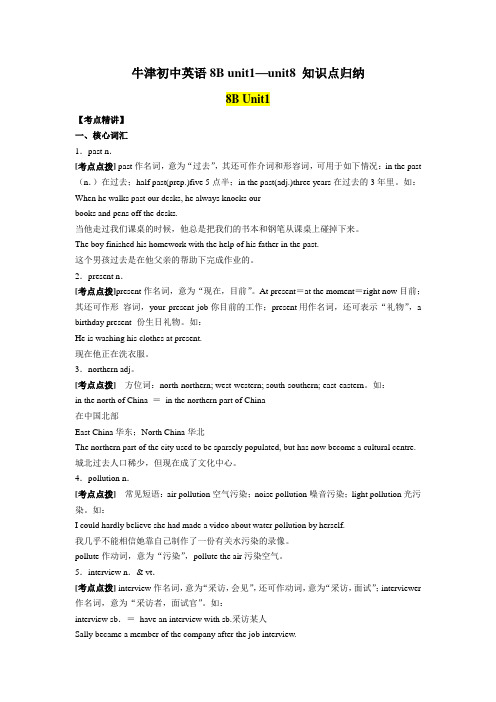
牛津初中英语8B unit1—unit8 知识点归纳8B Unit1【考点精讲】一、核心词汇1.past n.[考点点拨] past作名词,意为“过去”,其还可作介词和形容词,可用于如下情况:in the past (n.)在过去;half past(prep.)five 5点半;in the past(adj.)three years在过去的3年里。
如:When he walks past our desks, he always knocks ourbooks and pens off the desks.当他走过我们课桌的时候,他总是把我们的书本和钢笔从课桌上碰掉下来。
The boy finished his homework with the help of his father in the past.这个男孩过去是在他父亲的帮助下完成作业的。
2.present n.[考点点拨]present作名词,意为“现在,目前”。
At present=at the moment=right now目前;其还可作形容词,your present job你目前的工作;present用作名词,还可表示“礼物”,a birthday present -份生日礼物。
如:He is washing his clothes at present.现在他正在洗衣服。
3.northern adj。
[考点点拨] 方位词:north-northern; west-western; south-southern; east-eastern。
如:in the north of China =in the northern part of China在中国北部East China华东;North China华北The northern part of the city used to be sparsely populated, but has now become a cultural centre. 城北过去人口稀少,但现在成了文化中心。
牛津译林版八年级下册现在完成时用法讲解和配套练习(含答案)
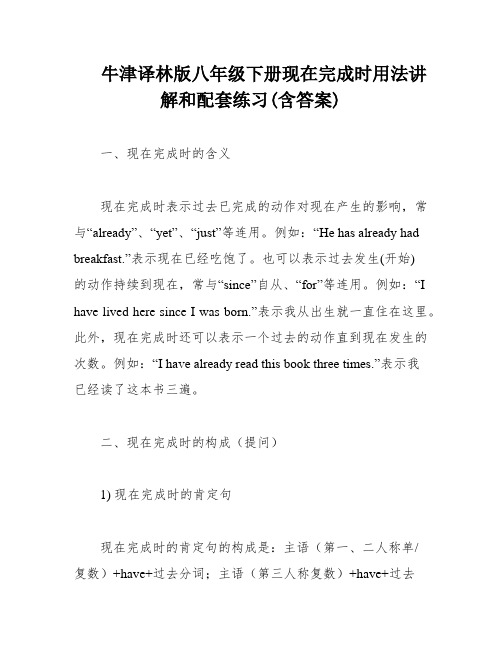
牛津译林版八年级下册现在完成时用法讲解和配套练习(含答案)一、现在完成时的含义现在完成时表示过去已完成的动作对现在产生的影响,常与“already”、“yet”、“just”等连用。
例如:“He has already had breakfast.”表示现在已经吃饱了。
也可以表示过去发生(开始)的动作持续到现在,常与“since”自从、“for”等连用。
例如:“I have lived here since I was born.”表示我从出生就一直住在这里。
此外,现在完成时还可以表示一个过去的动作直到现在发生的次数。
例如:“I have already read this book three times.”表示我已经读了这本书三遍。
二、现在完成时的构成(提问)1) 现在完成时的肯定句现在完成时的肯定句的构成是:主语(第一、二人称单/复数)+have+过去分词;主语(第三人称复数)+have+过去分词;主语(第三人称单数)+has+过去分词。
例如:“He has already had his ___.”表示他已经吃过午饭了;“I have just ___”表示我刚刚完成了作业。
2) 现在完成时的否定句现在完成时的否定句的构成是:主语+have/has not(___'t)+过去分词。
例如:“I have not seen the movie yet.”表示我还没有看过这部电影;“She hasn’t ___ it.”表示她还没有吃过它。
3) 现在完成时的一般疑问句现在完成时的一般疑问句的构成是:Have/Has+主语+过去分词+…?例如:“___?”表示你完成作业了吗?“___?”表示她已经到达这里了吗?“Have they eaten supper?”表示他们吃过晚餐了吗?三、过去分词的构成过去分词的构成有规则动词的过去分词和不规则动词的过去分词两种。
规则动词的过去分词参照动词的过去式变化规则。
牛津译林版英语八年级下册8BUnit1 Grammar现在完成时课件
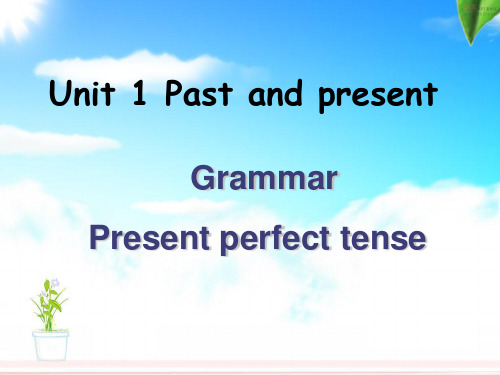
My daughter has studied dance for four years.
2.We use the present perfect tense to talk about an action that happened in the past and has a connection with the present. (过去的动作对现在有影响)
( be ) 4.Lucy h_a_s_ n_e_v_e_r s_p_o__k_e_n to a foreigner before.
( speak ) 5.I h_a_v_e_ _b_e_e_n to the Summer Palace t_w_i_c_e.
( be ) 6.We _h_a_v_e _v_is_i_t_e_d your school b_e_f_o_r_e. ( visit ) 7.He _h_a_s_n_’t_ f_o_u_n_d_ his history book y_e_t_.
Yes, I have. / No, I haven’t.
2. He has seen the dolphin show many times. 否 He hasn’t seen the dolphin show many times. 疑 Has he seen the dolphin show many times?
I have been in this school since 2002.
Seventeen and a half years has passed since I came to this school.
It has been / is seventeen and a half years since I came to this school.
牛津英语八年级下8B现在完成时讲解+练习(含答案)

现在完成时have (has) +过去分词(v.+ed)用法一.表示动作发生在过去,但对现在留下了影响和结果,常与下列词连用。
已经,了,过①just (刚刚)用于肯定句。
He ______ just ___________(come).-____ you ____(have) lunch yet? -Yes, I ______. I_____ just ________ it.②never(从来没有)表示否定。
He ______ never ________ (visit) the Great Wall.③ever(曾经)用于疑问句中。
______ you ever_______ (be) to the farm?④before(以前)用于句末。
The woman ______ never ________ (hear) of that before.⑤yet(仍然)用于疑问句或否定句. ______ the train ________ (arrive) yet? No, not yet.⑥already(已经)用于肯定句. We _____ already __________ (finish) it.⑦so far (迄今为止)用于句首或句末. So far, we _______________ (visit) the moon.up to now I _______( hear) nothing from him up to now. 到目前为止我没他的任何消息⑧once(一次),twice(两次),many times(很多次),how many times(多少次),during/in the past(last)three years(最近三年来) recently(最近)I ____________ (be) to Beijing twice。
我去过北京二次。
He__________ (be) there three times in the last few days. 近几年他去过那里三次了。
牛津译林版八年级下册 B 现在完成时
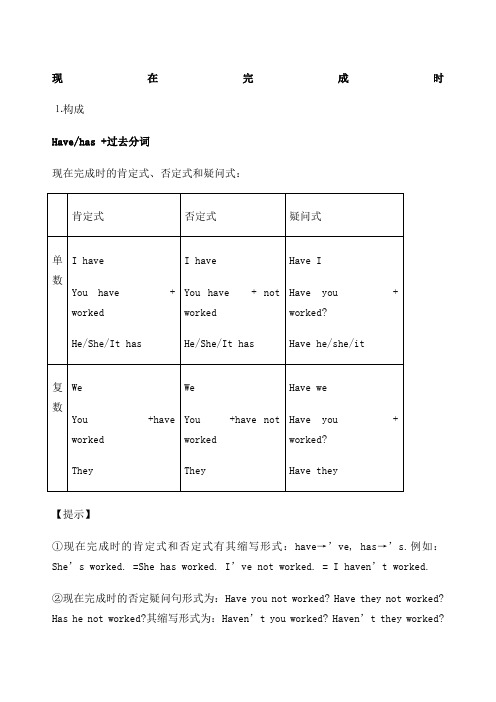
现在完成时⒈构成Have/has +过去分词现在完成时的肯定式、否定式和疑问式:【提示】①现在完成时的肯定式和否定式有其缩写形式:have→’ve, has→’s.例如:She’s worked. =She has worked. I’ve not worked. = I haven’t worked.②现在完成时的否定疑问句形式为:Have you not worked? Have they not worked? Has he not worked?其缩写形式为:Haven’t you worked? Haven’t they worked?Hasn’t he worked?③现在完成时的简略回答形式为:Yes, I have. No, I have not/haven’t.⒉用法⑴过去动作产生的影响等表示过去发生的某一动作对现在造成的影响或产生的结果。
在没有具体时间状语的情况下,现在完成时可以表示某一行为动作在说话之前已经完成,而其结果或影响至今仍然存在。
因此,现在完车时这一时态强调的是过去的动作同现在的联系,也就是强调现在的影响和结果。
例如:Someone has broken the window.(“打破”这一动作虽然发生在过去,但影响延续至今,其结果是窗子仍然是破的,The window is now broken.)I have lost my pen.(结果是:我现在无钢笔可用,I have no pen to use.)He’s locked the door.(结果是:现在门锁上了,我们进不去,Now the door is locked and we can’t go in.)The party has started. (The party started and now it is going on.)I’ve forgotten her name= I forgot her name.他今天还没吃任何东西.(现在一定很饿了)_________________________________________________________________我已经吃过午饭了(现在不饿了)____________________________________________________⑵过去的动作延续到现在和未来表示一个开始于过去,持续到现在,并可能继续下去的动作或状态,常同for, since 引导的时间状语连用,或用于How long…(多久)句型中,表示持续的时间。
牛津译林版英语8B八年级下册Unit2Grammar现在完成时课件
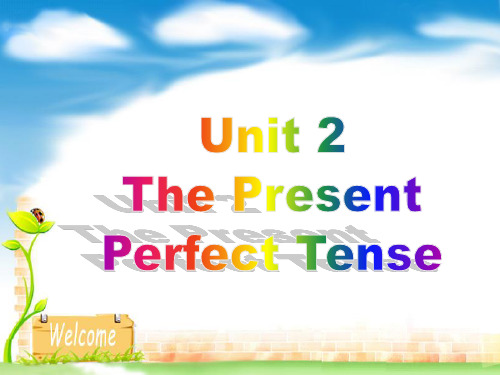
A. have a cold
2.buy ---- have
B. be on
3.catch a cold ---- have a coldC. keep
4.become ---- be
D. be
5.arrive/come/go---- be in / at E. be in / at
6.begin/start---- be on
been
2.He has j-o-i-n--e-d the League for 3 years.
been in/a member of
3.He has -le--f-t his hometown for 20 years.
been away from
4.He has d--ie--d for 20 years.
F. be closed/open
7.leave ---- be away from G. be away from
8.close/op--e--nbe closed/openH.be in/a member of
9.die ---- be dead
J. be dead
10.join ----be in/a member of K. have
Mr Black has been dead for three years.
It is/ has been three years since Mr Black died.
Three years has passed since Mr Black died.
days. (3)I bought the watch 2 weeks ago
=I _h_a_v_e_h__a_d_the watch since 2 weeks ago. (4)It is 5 days since I borrowed the book
- 1、下载文档前请自行甄别文档内容的完整性,平台不提供额外的编辑、内容补充、找答案等附加服务。
- 2、"仅部分预览"的文档,不可在线预览部分如存在完整性等问题,可反馈申请退款(可完整预览的文档不适用该条件!)。
- 3、如文档侵犯您的权益,请联系客服反馈,我们会尽快为您处理(人工客服工作时间:9:00-18:30)。
现在完成时⒈构成Have/has +过去分词现在完成时的肯定式、否定式和疑问式:【提示】①现在完成时的肯定式和否定式有其缩写形式:have→’ve, has→’s.例如:She’s worked. =She has worked. I’ve not worked. = I haven’t worked.②现在完成时的否定疑问句形式为:Have you not worked? Have they not worked? Has he not worked?其缩写形式为:Haven’t you worked? Haven’t they worked? Hasn’t he worked?③现在完成时的简略回答形式为:Yes, I have. No, I have not/haven’t.⒉用法⑴过去动作产生的影响等表示过去发生的某一动作对现在造成的影响或产生的结果。
在没有具体时间状语的情况下,现在完成时可以表示某一行为动作在说话之前已经完成,而其结果或影响至今仍然存在。
因此,现在完车时这一时态强调的是过去的动作同现在的联系,也就是强调现在的影响和结果。
例如:Someone has broken the window.(“打破”这一动作虽然发生在过去,但影响延续至今,其结果是窗子仍然是破的,The window is now broken.)I have lost my pen.(结果是:我现在无钢笔可用,I have no pen to use.)He’s locked the door.(结果是:现在门锁上了,我们进不去,Now the door is locked and we can’t go in.)The party has started. (The party started and now it is going on.)I’ve forgotten her name= I forgot her name.他今天还没吃任何东西.(现在一定很饿了)_________________________________________________________________我已经吃过午饭了(现在不饿了)____________________________________________________⑵过去的动作延续到现在和未来表示一个开始于过去,持续到现在,并可能继续下去的动作或状态,常同for, since引导的时间状语连用,或用于How long…(多久)句型中,表示持续的时间。
例如:He has studied English for ten years.(可能继续学下去)She has lived here since then.He has been in Nanjing since 2003.Miss Lin has worked in the factory since she came to the city.你已经住在这个房子里多久了?_____________________________________________________这个女孩已经病了一个星期了。
______________________________________________________【提示】for是介词,后面只能跟单词或词组;since是介词或连词,后面可以跟单词、词组或句子。
⑶同recently等状语连用现在完成时常同表示从过去某时刻延续到现在并包括现在在内的一段时间状语连用,如recently, today, this morning, this week, lately, up to now, so far, in the past/last few months, since three years ago等。
例如:I haven’t seen him this week.I have been busy this morning.He has bought a new bike recently.⑷同often等状语连用现在完成时常同不明确指出具体时间的状语连用,如often, already, yet, never, ever, always, once, twice, sometimes, just, for a long time, only twice等。
例如:Have you done your homework yet?我们已经完成了工作。
__________________________________我从没去过英国。
_______________________________________⑸将来某时已经完成的动作现在完成时可以用在条件或时间状语从句中,表示将来某个时刻之前已经完成的动作。
例如:He will come as soon as he has finished the homework.If you have read the book before I leave, please lend it to me.We shall wait here until the rain has stopped.⑹have gone和have beenhave gone和have been意义上不同,前者表示“到某地去了,尚没回来,现在不在这里”,后者表示“曾经到过某地,现在已返回”。
比较:She has gone to Beijing.(她现在不在这里,去北京了,可能已经到达,也可能仍在途中)She has been to Beijing.(她以前到过北京,现在已不在北京了)Where has he been?(他已回来)Where has he gone?(他现在不在这里)比较:have been to do sth做过了某事have gone to do sth去做某事了have come to do sth来做某事了⑺for 2004还是since 2004英语中有些动词表示的动作是一时性的、短暂的、不能延续的,所以,不能同for和since 等引导的表示一段时间的状语连用,也不可用于“How long/How many+时间名词”句中。
因此,这类动词可以单独使用于完成时中,但不可同表示一段时间的状语一起用于完成时中,包括现在完成时和过去完成时。
这类动词有:go, come, leave, arrive, join, receive, get, die, buy, borrow, choose, close, fall, finish, kill, lend, marry, open, reach, return, start, stop, sit down, stand up等。
比较:How long may I keep the book?Her grandmother has been dead for five months.It is five months since her grandfather died.He has arrived.He arrived there three hours ago.It’s three hours since he arrived.It has been three hours since he arrived.He has been away from Shanghai for two weeks.It is two weeks since he left Shanghai.He has left Shanghai.She has joined the army.She has been in the army since 20004.It is three years since she joined the army.【提示】①非延续性动词的完成时有时可以同for引导的短语连用,但表示的是某一动作的目的或结果,而不是表示动作本身延续的时间。
例如:She has come for two weeks.她已经来了,准备住两个星期。
He has gone for three days.他走了,要在三天后回来。
②非延续性动词的否定式表示动作的持续过程,具有延续性,因此可以同for或since引导的一段时间状语连用。
例如:I haven’t received her letter for a whole year.He hasn’t bought any book since last month.for/since的特殊注意:在带有for或since短语或since从句的句子中以及How long提问的句子中,谓语动词只用延续性动词(可持续一段时间的动作),而不能用短暂性动词(在瞬间发生完毕的动作)常见的短暂性动词与延续性动词的转换borrow/lend have(has) keptbuy have(has) had/owneddie have(has) been deadbegin/start have(has) been onfinish have(has) been overopen have(has) been openclose have(has) been closedcatch a cold have(has) had a coldfall ill have(has) been illfall asleep have(has) been illbecome have(has) beenleave have(has) been away fromget married have(has) been marriedjoin have(has) been a member ofhave(has) been inmove/come/go to have(has) been in/at⑻现在完成时和一般过去时的比较①现在完成时不可与表示特定过去时间的副词连用,如ago, then, yesterday等,但一般过去时可以。
例如:He worked here last year.②现在完成时强调过去的动作对现在的影响或产生的结果,而一般过去时只限于表示过去的动作本身,与现在的结果无关。
例如:He has been ill for a week.(现在仍然病着)He was ill for a week.(过去病过一个星期,现在好了)He has bought a house(现在完成时,到说话时仍然拥有那所房子)He bought a house five years ago(一般过去时只说明他五年前买过一所房子,现在不一定还拥有那所房子)I haven’t written him for ages.(现在仍没有写)I didn’t write him for ages(仅指过去)③现在完成时可以同现在在内的时间状语连用;而一般过去时则不可。
